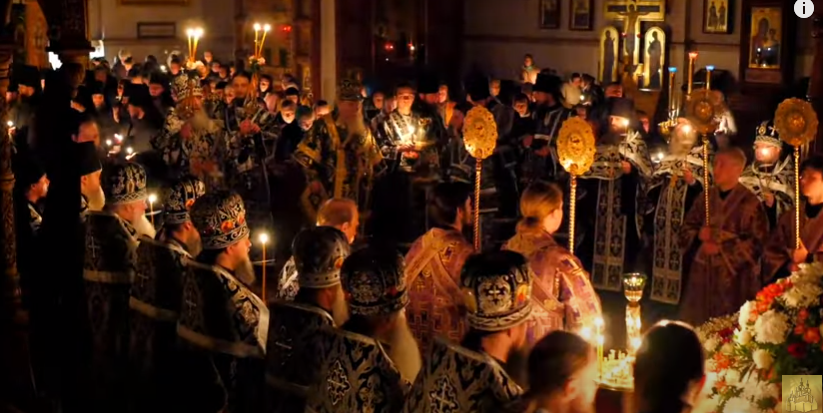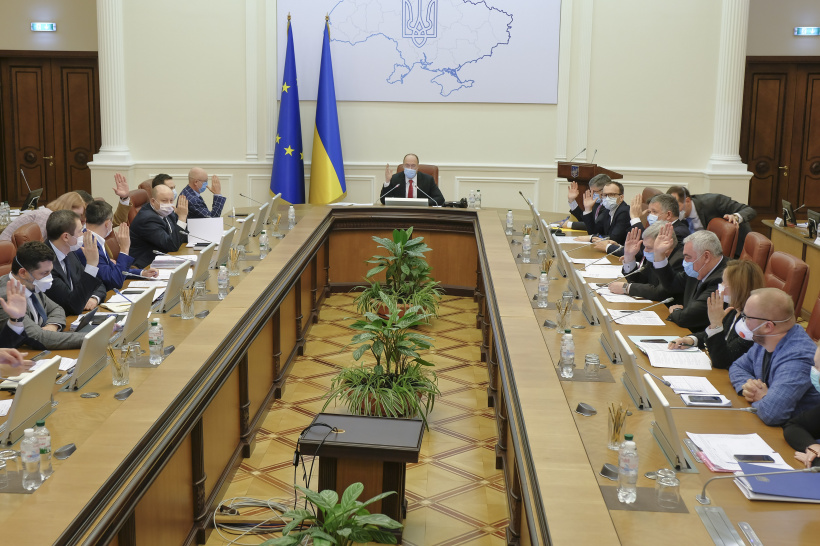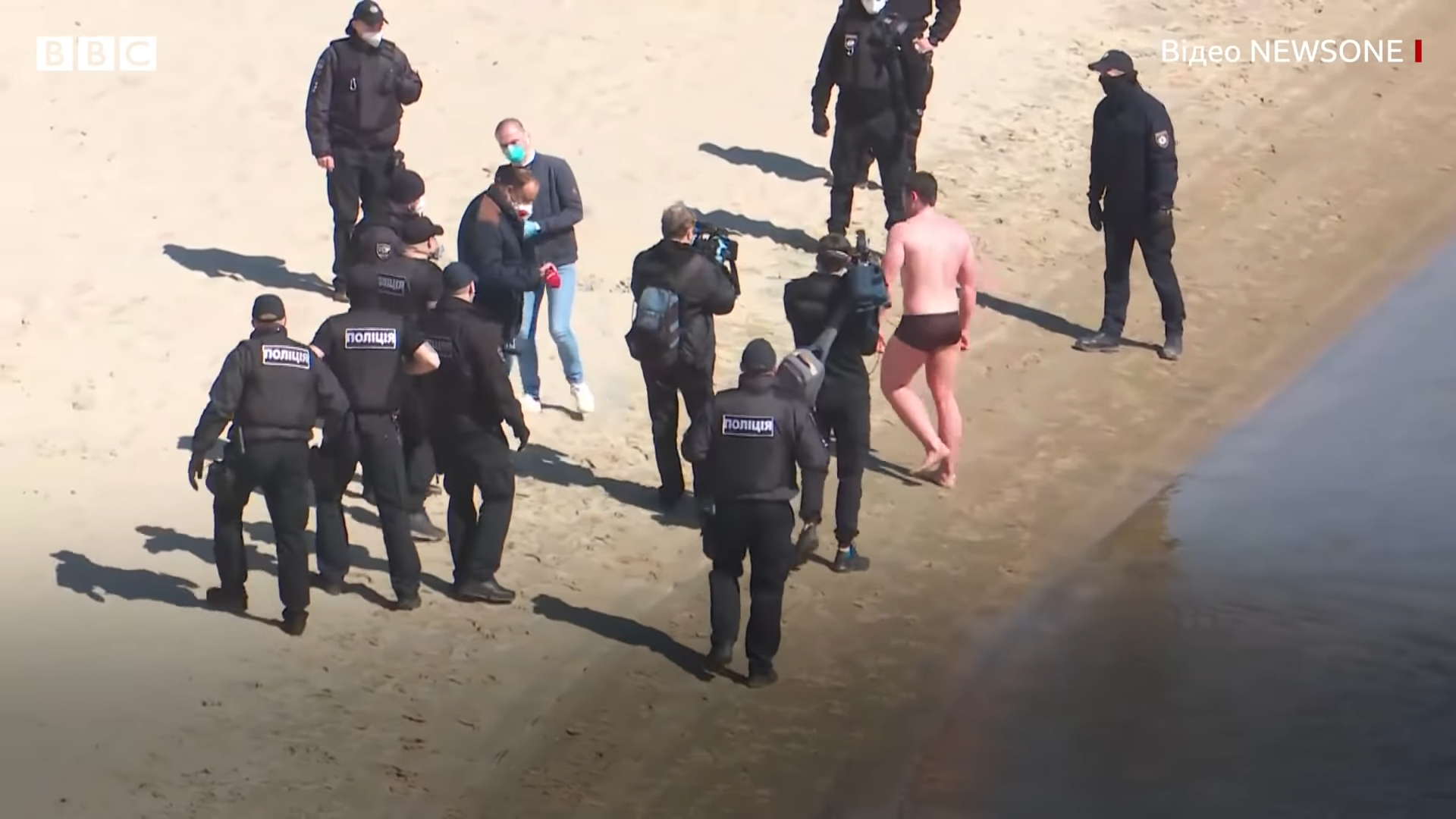Easter as a COVID-19 hazard
Metropolitan Onufriy, the primate of the UOC MP, at publication time was reportedly hospitalized
with COVID-19. But the UOC MP's plans remain unchanged: those ill with COVID-19 may remain home and watch the Easter church service on TV. The others are not prohibited from praying outside the churches. Ukraine's current quarantine restrictions stipulate that no more than 10 people at a time may be inside a church, apart from other measures, such obligatory masks in public areas. In reality, this means that the priest and clergy hold the service indoors, and any present parishioners stand outside to pray, hopefully, with a safe distance between each other.
But the traditions of celebrating Easter in Ukraine mean that most people, even if they are nominal Orthodox Christians, bring baskets of food for their Easter banquet to churches to have it blessed by a priest. The symbols of Ukrainian Easter are a sweet bread called paska and colored eggs - and, of course, they need to be blessed. Only the religious attend the Easter service; but everybody blesses the food, getting together in merry crowds.
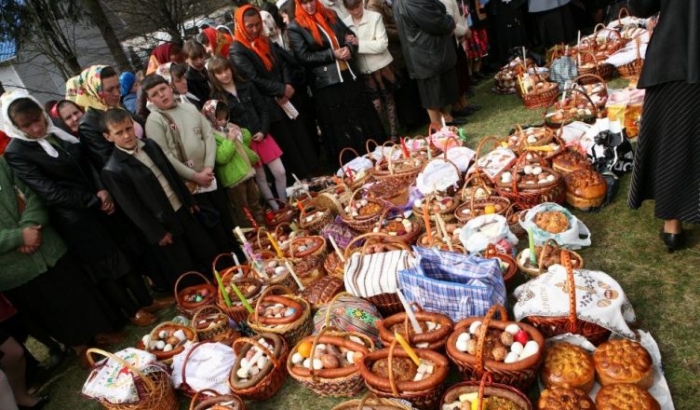
The Ukrainian Ministry of Internal Affairs foresaw the threat that such a gathering of people will pose for the ongoing COVID-19 pandemic in Ukraine. At a meeting with religious leaders, rules were elaborated not only for Christian Easter, but also for Jewish Pesach and Muslim Shab-e-Barat. They envision that for Easter, only priests, clergy, and a broadcasting team may be inside the church building; regular believers can come inside the church after the service, 1-2 people at a time, no queues are allowed. Paska bread sold in stores is to be blessed by priests before it goes out on supermarket shelves.
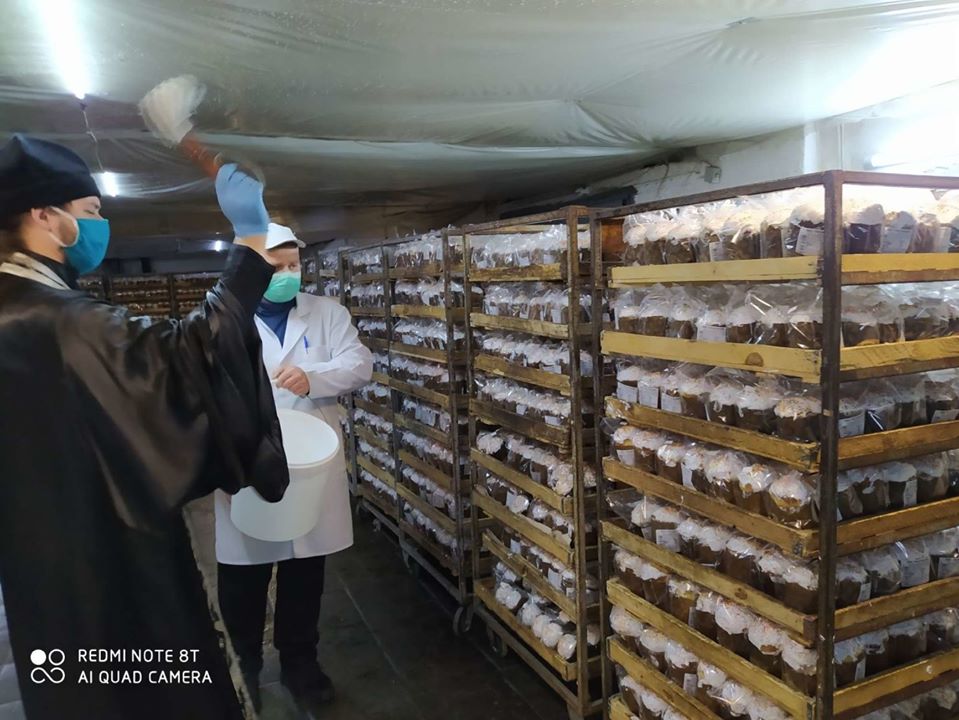
The leaders of the Orthodox Church of Ukraine, which became independent roughly a year ago, and the Greek Catholic Church, have called on believers to stay at home for Easter and even offered instructions on self-blessing paskas at home, so that the faithful can resist the temptation to pursue traditional Easter activities amid a pandemic But not UOC MP leader Metropolitan Onufriy, who persuaded only those who are ill to stay at home, and said nothing about whether paskas will be blessed on Easter Sunday, which easily leads to assumptions that this will indeed happen.
It's highly likely that such a deep-seated tradition will have people on the streets if they hear that the usual blessings are being held somewhere, mingling and exchanging coronaviruses. Last Sunday was a case-in-point: on Palm Sunday, it's Ukrainian tradition to bless pussy willows in churches, and UOC MP churches across the country drew crowds with little, if any, social distancing to be seen.
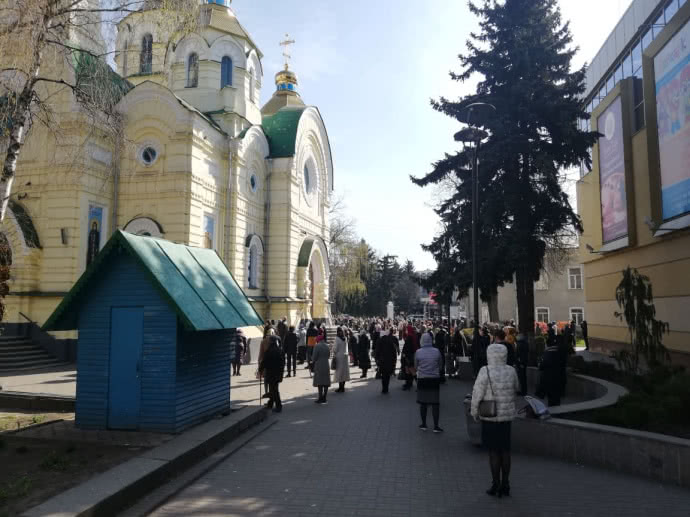
And such mass gatherings are sure to result in a spike of infections some weeks later, as we've seen
in the UK, where outbreaks were precipitated by football games which the government had failed to cancel.
Moscow Patriarchate scoffs at coronavirus
The UOC MP has taken a skeptical stance towards the COVID-19 pandemic from the very onset.
Metropolitan Pavlo, who heads the Moscow-backed Orthodox Church's #1 monastery in Ukraine, the Kyiv-Pechersk Lavra, initially said that the coronavirus could be fought by hugs, prayers, and fasting, calling on young and old to come to church and receive Communion.
Then, he was hospitalized and said he underestimated the gravity of the disease. The Lavra was disinfected and closed off to parishioners. Now, it is a major epicenter of COVID-19 cases in Kyiv: from the 65 new cases on 17 April, 26 were from the Lavra. But there is no sign that the management of the monastery, which also houses the UOC MP's main theological academy, has changed their views. According to Euromaidan Press' sources, despite it being known that the Lavra and academy are a COVID-19 hotspot, the management is inciting students to perform at the choir during church services, portraying this as an act of faith not for the cowardly. This is particularly cynical - while there is little doubt that Metropolitan Pavlo will get the best medical treatment, it is unlikely that the same will go for the students of the academy.
Other UOC MP monasteries, seen as the centers of this church's spiritual life, have also scoffed at the COVID-19 threat. It is suspected that the Pochaiv monastery in western Ukraine has eight
COVID-19 cases, However, the monastery's leadership denies there is a problem, keeps the monastery open to visitors, and has refused collaboration with Ukraine's Ministry of Health.
Another major monastery, the Sviatohorsk Lavra in eastern Ukraine, has taken a similar stance. Official photos from the church services right before Easter (see featured photo and the one below) reveal that it's operating in "business as usual" mode with no regard for COVID-19 restrictions, with not even a mask in sight.
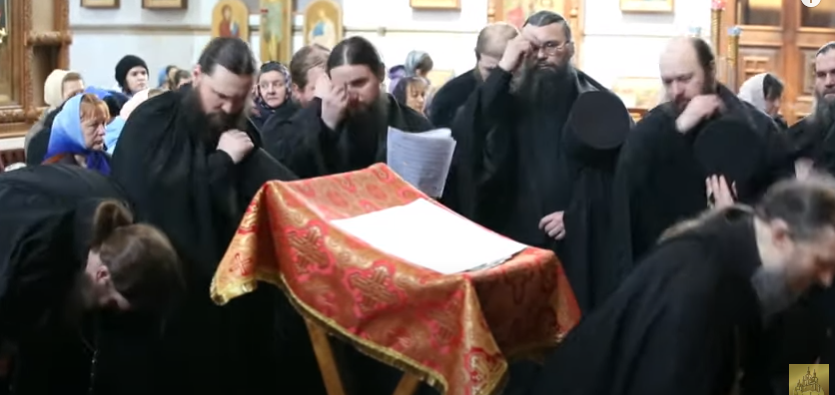
Why the defiance?
Why is the UOC MP defying the reality of a deadly disease, if even its "mother church" in Moscow is calling upon its faithful to observe quarantine?
Experts believe that this is not a demonstration of independence. According to prominent religious scholar Viktor Yelenskyi, the UOC MP hardly does anything that's not in accordance with Russia. Rather, this is a sign of deep, albeit selective fundamentalism, which manifests itself in believing that Communion disinfects viruses, but disappears when its lavish possessions come under question. Religious expert Yuriy Chornomorets says that at first the Synods of both the Russian Orthodox Church in Moscow and its subsidiary in Kyiv decided to ignore COVID-19 and continue business as usual, but the state managed to pressure the church in Russia into cooperating. Religious fanatics both in Russia and Ukraine are carrying out services while only pretending to observe restrictive measures, while in reality attempting to attract as many parishioners as possible.
Another explanation for the UOC MP's behavior is their possible belief to be seen as the most hardcore of churches that did not give in to the government's pressure and is ready to "stand in the faith" against "attacks." As the lives of the Orthodox Church in Ukraine, both the UOC MP and OCU, are focused around rituals in shrines, it is easy to see why fundamentalists equate restrictions on visiting church buildings with attacks on faith: there is simply little else to offer in terms of spiritual life.
Competition with the OCU for parishioners is yet another reason. After receiving independence from Ecumenical Patriarch Bartholomew in January 2019, the OCU has moved to position itself as the mainstream Orthodox Church in Ukraine, leaving the Russian-affiliated Church competing for attention and influence and regularly crying wolf about political repressions. Being present on the street during Easter is a chance for the Moscow Patriarchate in Ukraine to win over hearts, and establish itself as the "true" influential church that is not scared of a virus - at the price of endangering its parishioners, and the rest of the country through them.
But why is the Ukrainian government, which took swift and harsh anti-COVID measures, tolerating this behavior? Euromaidan Press' sources offer a realistic version: the UOC MP has threatened to start complaining about unprecedented political repressions against Christianity, because "even in Soviet times, the government did not dare close the churches." This sort of propaganda is something that President Zelenskyy's ratings, already in a nosedive, would hardly appreciate.
However, not all local authorities are equally tolerant of the stunts of the Moscow Church in Ukraine. In the central-Ukrainian city of Dnipro, mayor Borys Filatov threatened to turn off the power and water of parishes that do not observe quarantine. To prove that the threats are real, the entrance to one such church was last week blocked by "urgent" excavation measures.
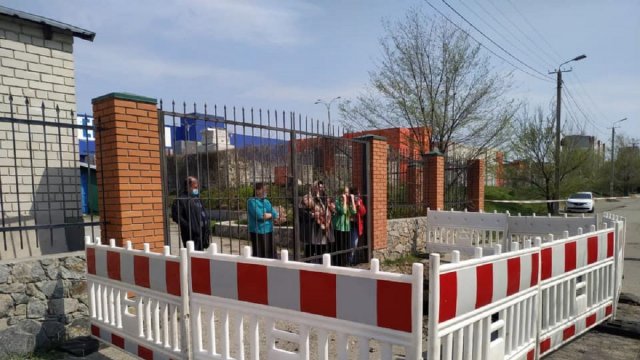
Photo: Mykhailo Lysenko, deputy mayor of Dnipro

